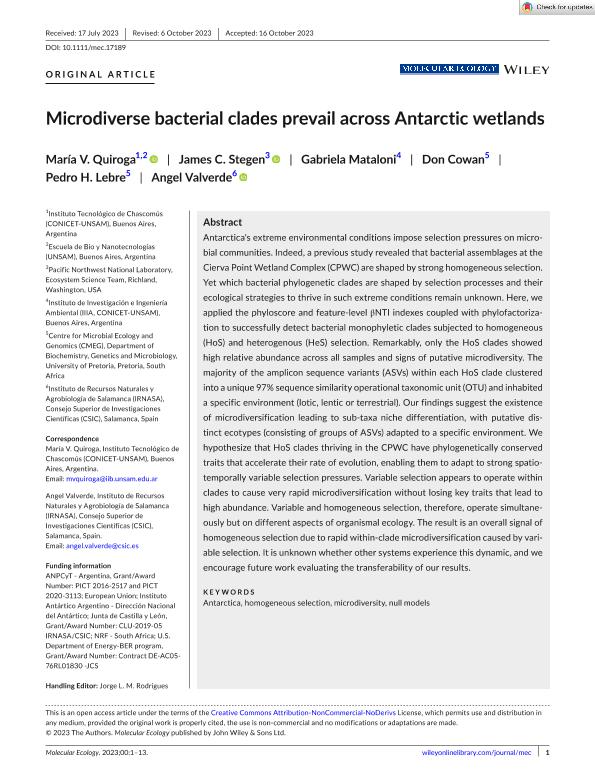Mostrar el registro sencillo del ítem
dc.contributor.author
Quiroga, María Victoria

dc.contributor.author
Stegen, James C.
dc.contributor.author
Mataloni, Maria Gabriela

dc.contributor.author
Cowan, Don
dc.contributor.author
Lebre, Pedro H.
dc.contributor.author
Valverde, Angel
dc.date.available
2023-12-14T14:05:58Z
dc.date.issued
2023-11
dc.identifier.citation
Quiroga, María Victoria; Stegen, James C.; Mataloni, Maria Gabriela; Cowan, Don; Lebre, Pedro H.; et al.; Microdiverse bacterial clades prevail across Antarctic wetlands; Wiley Blackwell Publishing, Inc; Molecular Ecology; 11-2023; 1-13
dc.identifier.issn
0962-1083
dc.identifier.uri
http://hdl.handle.net/11336/220347
dc.description.abstract
Antarctica's extreme environmental conditions impose selection pressures on microbial communities. Indeed, a previous study revealed that bacterial assemblages at the Cierva Point Wetland Complex (CPWC) are shaped by strong homogeneous selection. Yet which bacterial phylogenetic clades are shaped by selection processes and their ecological strategies to thrive in such extreme conditions remain unknown. Here, we applied the phyloscore and feature-level βNTI indexes coupled with phylofactorization to successfully detect bacterial monophyletic clades subjected to homogeneous (HoS) and heterogenous (HeS) selection. Remarkably, only the HoS clades showed high relative abundance across all samples and signs of putative microdiversity. The majority of the amplicon sequence variants (ASVs) within each HoS clade clustered into a unique 97% sequence similarity operational taxonomic unit (OTU) and inhabited a specific environment (lotic, lentic or terrestrial). Our findings suggest the existence of microdiversification leading to sub-taxa niche differentiation, with putative distinct ecotypes (consisting of groups of ASVs) adapted to a specific environment. We hypothesize that HoS clades thriving in the CPWC have phylogenetically conserved traits that accelerate their rate of evolution, enabling them to adapt to strong spatio-temporally variable selection pressures. Variable selection appears to operate within clades to cause very rapid microdiversification without losing key traits that lead to high abundance. Variable and homogeneous selection, therefore, operate simultaneously but on different aspects of organismal ecology. The result is an overall signal of homogeneous selection due to rapid within-clade microdiversification caused by variable selection. It is unknown whether other systems experience this dynamic, and we encourage future work evaluating the transferability of our results.
dc.format
application/pdf
dc.language.iso
eng
dc.publisher
Wiley Blackwell Publishing, Inc

dc.rights
info:eu-repo/semantics/openAccess
dc.rights.uri
https://creativecommons.org/licenses/by-nc-nd/2.5/ar/
dc.subject
ANTARCTICA
dc.subject
HOMOGENEOUS SELECTION
dc.subject
MICRODIVERSITY
dc.subject
NULL MODELS
dc.subject.classification
Ecología

dc.subject.classification
Ciencias Biológicas

dc.subject.classification
CIENCIAS NATURALES Y EXACTAS

dc.title
Microdiverse bacterial clades prevail across Antarctic wetlands
dc.type
info:eu-repo/semantics/article
dc.type
info:ar-repo/semantics/artículo
dc.type
info:eu-repo/semantics/publishedVersion
dc.date.updated
2023-12-14T13:15:43Z
dc.journal.pagination
1-13
dc.journal.pais
Reino Unido

dc.journal.ciudad
Londres
dc.description.fil
Fil: Quiroga, María Victoria. Universidad Nacional de San Martin. Instituto Tecnologico de Chascomus. - Consejo Nacional de Investigaciones Cientificas y Tecnicas. Centro Cientifico Tecnologico Conicet - la Plata. Instituto Tecnologico de Chascomus.; Argentina
dc.description.fil
Fil: Stegen, James C.. No especifíca;
dc.description.fil
Fil: Mataloni, Maria Gabriela. Universidad Nacional de San Martín. Instituto de Investigación e Ingeniería Ambiental. - Consejo Nacional de Investigaciones Científicas y Técnicas. Oficina de Coordinación Administrativa Parque Centenario. Instituto de Investigación e Ingeniería Ambiental; Argentina
dc.description.fil
Fil: Cowan, Don. University Of Pretoria; Sudáfrica
dc.description.fil
Fil: Lebre, Pedro H.. University Of Pretoria; Sudáfrica
dc.description.fil
Fil: Valverde, Angel. Consejo Superior de Investigaciones Científicas; España
dc.journal.title
Molecular Ecology

dc.relation.alternativeid
info:eu-repo/semantics/altIdentifier/url/https://onlinelibrary.wiley.com/doi/10.1111/mec.17189
dc.relation.alternativeid
info:eu-repo/semantics/altIdentifier/doi/http://dx.doi.org/10.1111/mec.17189
Archivos asociados
